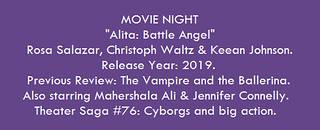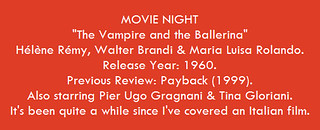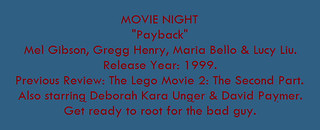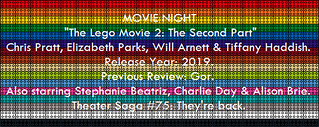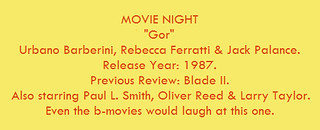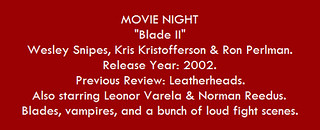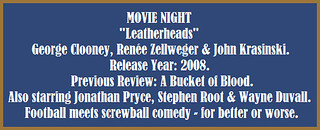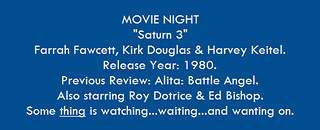
Review #1194: Saturn 3.
Cast:
Farrah Fawcett (Alex), Kirk Douglas (Adam), Harvey Keitel (Captain Benson; voiced by Roy Dotrice), and Ed Bishop (Harding) Directed by Stanley Donen (#137 - Bedazzled (1967), #227 - Singin' in the Rain, #346 - On the Town, and #1029 - Charade)
Review:
Whether a film is good or not, even the terrible ones can have an interesting story to tell about how it came to be. John Barry was a production designer for hit films in the 1970s such as A Clockwork Orange (1971), Star Wars (1977), and Superman (1978). He had expressed an interest in making a film of his own, and he approached Stanley Donan with an idea that would be presented as a Gothic sci-fi thriller. Although Donan was not interested in directing the feature due to not having much interest in science fiction, he encouraged Barry to develop an outline, which he developed into a draft that he showed to Donan. He felt that the idea could work for Barry's directorial debut, albeit with a need for help with developing the screenplay. Martin Amis (writer of novels such as Dead Babies but who had no prior experience with screenplays) was enlisted to develop a draft, which was presented by Donan to Lord Lew Grade (producer of shows such as Thunderbirds and The Prisoner) in 1978 for consideration. While having the script in his possession on an airplane trip, Grade happened to be seated next to Fawcett and her representative; he showed her the script (under the working title The Helper), and she expressed interest, which led to her making a deal with Grade to be in the project. After signing Douglas and Keitel, the film had their prime trio and began production in late January 1979. Donen described the film at one point as “...both sensuous and sensual, full of chills, fright and horror. It’s science fiction, but not ‘comic strip’ SF....It’s something of a Frankenstein story, and meant to frighten audiences in a very unusual way.” Colin Chilvers dealt with the construction of the robot, which cost over $1 million to make, while Stuart Craig was charged with production design, such as the interior of the Titan research station - it should be noted that the Saturn 3 set took over four months to build while running a distance of 280 feet for a film with a final budget of $10 million, with production overruns from Raise the Titanic (ITC Entertainment's other big production at the time) resulting in cutbacks for this film.
As much I do not like to emphasize age when it comes to a film, it certainly is a bit odd to see Fawcett and Douglas as a couple, in part because of the 30 year age difference between the two. Originally the idea was to have Sean Connery cast in the role of the older male lead, but plans fell through for that, leading to Douglas being cast. Douglas had strife with Barry, whose time as director proved short. Two weeks into production, he left the production, with Donan stepping in as director. Donan stated that Barry's departure was due to Barry's lack of experience on a film set in dealing with actors and staging scenes (as said by Donan, while calling him a "terrific talent"). It should be noted that the film has a run-time of 88 minutes; at least fifteen minutes were cut out of the movie (reportedly due to Grade's objection to them), with one notable scene being cut out involving a dream sequence of Adam killing Benson after the two try some sort of space pill. It should be mentioned that there also existed a television cut of the film that was 96 minutes long that included extensions and additions while toning done some of the film's violence. The final little nugget of weirdness came when Keitel refused to post-synch his dialogue, leading to a re-dubbing of his character by Roy Doctrice. Imagine making a film relying on three main characters and having one of them not even use their own voice the whole time - it sure is a strange thing.
With all of that background, it is no wonder that this did not turn out to be a great film. It is a tremendous exercise in ridiculousness for the science fiction genre, having a hodgepodge of cliches that make the movie seem like a strange blend of numerous movies, such as Alien (1979), Forbidden Planet (1956), but also Demon Seed (1977) while being worse than all three. It is a strange little movie, having no real sense of tension or wonder while having one of the stranger love pursuits - this time with a nutty creep and his lumbering Frankenstein robot (powered by baby brains). It is pretty evident that this script must have gone through numerous revisions, which reminds me of the Infinite monkey theorem (a monkey hitting keys at random on a typewriter keyboard for an infinite amount of time will almost surely type any given text) and if it was like that, but with script doctors. How can anyone make dialogue such as "Your body is very beautiful. I'd like to use it" or scenes such as Douglas (wearing no clothes) choking out Keitel work without making someone cringe (or giggle)? Fawcett seems to come out of it with the least lost, in part because her warmth and charm works just fine that fits the horror type okay. Douglas is simply not the right guy for the part, but at least he is hammy enough to enjoy in his attempts to have chemistry with Fawcett. Keitel (or more specifically, Doctrice) is creepy, but he isn't too particularly interesting to go along with, not having enough menace to really make this seem worthy of chills. By the time the film tries to pull a shocker for a climax (at least I assume its supposed to be surprising), the film already has run out of air. At least the robot seems interesting, but it seems as if they really wanted to make something different involving this robot as some sort of innocent Frankenstein's monster type, but really it is not much more than a killer robot that inhabits passion for Fawcett. The effects are decent, and the sprawling set is interesting - but it can't elevate the movie and its material to anything captivating. What we have here is a movie that is occasionally weird to point and look at while perhaps having a laugh, but what we don't have is something that is actually any good. It is a middle-of-the-road kind of film that can't be trashed as all-around terrible (despite some efforts on the part of the film) nor one that merits much of a following. It could be worth it as a curiosity for someone looking for a ridiculous failure piece - or some groans.
Next Review - Raise the Titanic.
Overall, I give it 5 out of 10 stars.

